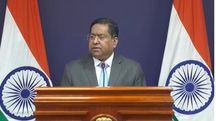Supreme Court declines to intervene in SEBI's investigation of Adani-Hindenburg dispute
The Supreme Court on January 2 dismissed petitions related to the Adani probe, emphasizing the limited authority of the court to intervene in SEBI's domain.

The Supreme Court on January 2 dismissed petitions related to the Adani probe, emphasizing the limited authority of the court to intervene in SEBI's domain.
The court found no valid reasons to instruct SEBI on regulating its amendments under delegated legislative powers. Additionally, the apex court rejected four public interest petitions against the Adani group, highlighting the rejection of reliance on the OCCPR report and the inability to consider a third-party organization's report without verification as conclusive evidence.
The Supreme Court reiterated its limited power to intervene in SEBI's domain, urging the regulator to draw logical conclusions in accordance with the law.
The court found no valid grounds to instruct SEBI to regulate its amendments made through delegated legislative powers.
SEBI has concluded its investigation into 22 out of 24 allegations, with a directive to complete the remaining 2 within the next 3 months. Allegations against members of the expert committee were deemed unsubstantiated.
The court stated that there is no basis to transfer the probe unless there is a willful or deliberate violation of rules.
Rejection of reliance on the OCCPR report and emphasis that a third-party organization's report, without verification, cannot be considered as proof.
The government and SEBI were urged to consider the committee's recommendations to enhance the interests of Indian investors.
Both the government and SEBI were instructed to investigate any potential violation of law indicated by the Hindenburg report.
SEBI's use of the term "opaque" to describe the FPI was clarified, noting a misconception by the expert committee.
In conclusion, the Supreme Court's rulings bring clarity and direction to the Adani-Hindenburg case, emphasizing adherence to due process, evidence-backed claims, and a thorough investigation into the allegations. As the case progresses, these directives are likely to shape the course of actions taken by SEBI and the government, ensuring a fair and transparent resolution.
Also read : Assam Rifles conduct mobile medical camp at remote Khona village in Arunachal
Copyright©2025 Living Media India Limited. For reprint rights: Syndications Today









